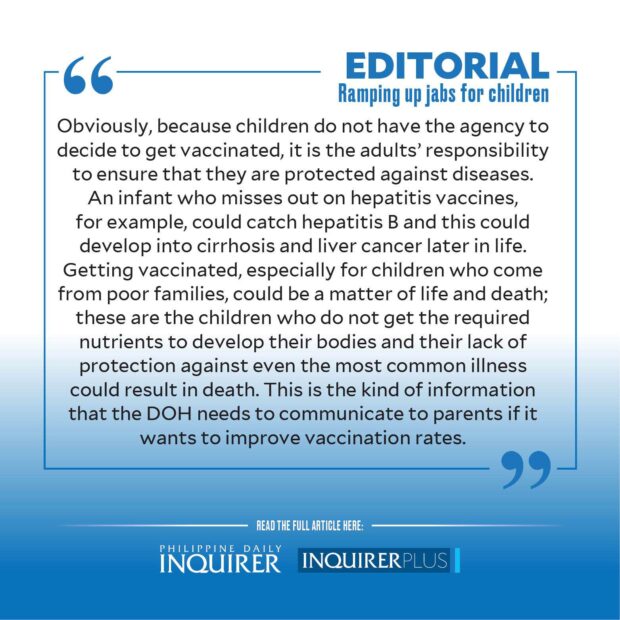The report by the United Nations International Children’s Emergency Fund (Unicef) that a million children in the Philippines have not yet received at least one routine vaccine is not new. But the call of Sen. Nancy Binay this week to ramp up immunization for children should push things along because unvaccinated children could lead to outbreaks that would further burden the country’s fragile health system.
Unicef already reported in October last year that the Philippines is one of the countries with the highest number of “zero-dose children,” or those who have not received a single dose of childhood vaccine including polio, measles, and tuberculosis (TB). Two reasons were cited why public confidence in vaccines here has declined by 25 percentage points, per the Vaccine Confidence Report published this month by Unicef: cultural factors and concerns on vaccine safety. The controversy that surrounded the dengue vaccine Dengvaxia in 2017 continues to hound Filipino parents, and the COVID-19 pandemic worsened the backlog for children’s vaccination. In addition, misleading information has added to the doubts over vaccines—not only for children but for adults as seen in the slow uptake of COVID-19 vaccines especially in the rural areas.
The Department of Health (DOH) should address this vaccine hesitancy with more vigor and urgency. Half a year has already passed since the Unicef report and the pandemic excuse no longer cuts it—the coronavirus, in fact, could have been the perfect opportunity to strengthen the vaccination campaign against diseases. Vaccines protect children from life-threatening diseases and to miss out on one could turn common childhood ailments into killer diseases or develop into serious illnesses in adulthood. Routine vaccines include: BCG (bacille Calmette-Guérin) vaccine against TB; hepatitis B vaccine; pentavalent (DTP-HepB-Hib) vaccine against diphtheria, pertussis, tetanus, Influenza B, and hepatitis B; oral polio vaccine (OPV); inactivated polio vaccine (IPV); pneumococcal vaccine (PCV) against pneumonia and meningitis; and measles, mumps, and rubella (MMR) vaccine.
Most of these vaccines, particularly BCG, hepatitis B, and DTP-HepB-Hib, are given to newborns while the rest are administered in the first three months of the child’s birth. For these routine vaccines to be effective, however, children must complete the required doses from the time of their birth until they are one year old. Various reasons, other than vaccine hesitancy, such as poverty, inaccessible health services, and lack of understanding of the importance of vaccination often lead to children not getting inoculated.
Obviously, because children do not have the agency to decide to get vaccinated, it is the adults’ responsibility to ensure that they are protected against diseases. An infant who misses out on hepatitis vaccines, for example, could catch hepatitis B and this could develop into cirrhosis and liver cancer later in life. Those who miss out on the Hib vaccine, on the other hand, could catch different kinds of infections that could later lead to pneumonia or complications with the blood, bones, or heart that could be fatal. Getting vaccinated, especially for children who come from poor families, could be a matter of life and death; these are the children who do not get the required nutrients to develop their bodies and their lack of protection against even the most common illness could result in death. This is the kind of information that the DOH needs to communicate to parents if it wants to improve vaccination rates.
It does take a village to raise a child and crucial to this chain of information is the barangay health worker (BHW) who is tasked to deliver health care services at the grassroots level. But like other public service workers, BHWs need support. Last January, President Marcos pushed for the immediate passage of the Magna Carta for Barangay Health Workers which requires local government units to train and accredit BHWs, provide them with a monthly honoraria of no less than P3,000, as well as hazard, transportation, and subsistence allowances, retirement cash incentive, etc. The House of Representatives has already passed the measure on third and final reading last December while a counterpart bill at the Senate is still pending at the committee level. What senators like Binay can do is push for the bill’s passage as BHWs are crucial in helping DOH campaigns—such as “Chikiting Ligtas” which targets vaccination for children in vulnerable and disadvantaged communities—be more effective.
COVID-19 was a crucial lesson on the importance of vaccines. Infectious diseases will continue to pose a risk and it is best to protect children—as well as adults—against future outbreaks and pandemics by getting them vaccinated. Vaccines, as Dr. Rajendra Yadav, acting World Health Organization representative to the Philippines, said, “give everyone the opportunity to reach their full potential and pursue a life well-lived.”
